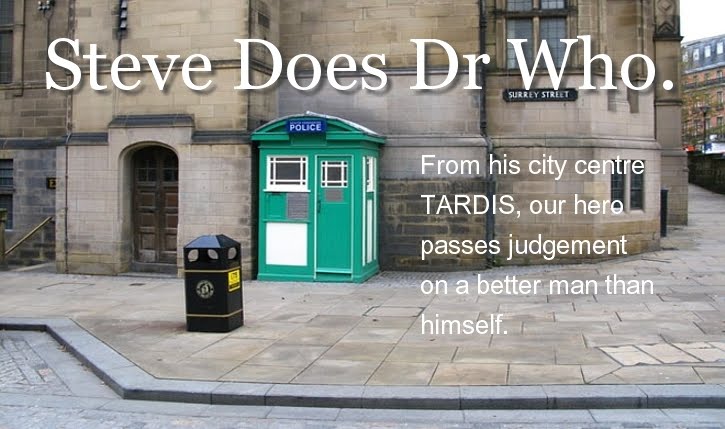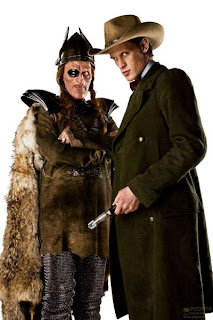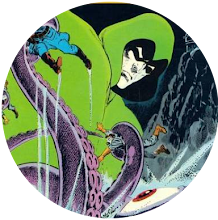A man rarely enjoys being split in two, and so the question was how would Dr Who cope with 2011 being a year of two halves?
Well, the way it started suggested it'd cope quite nicely as The Impossible Astronaut promptly flung a hand grenade under us with the death of the Doctor before growing more baffling and mysterious by the minute. It was anyone's guess just what was going on but it was never less than gripping, with a great cliff-hanger ending that saw our protagonists facing certain death.
Its follow-up - The Day of the Moon - suffered from a poorly judged beginning, the equivalent of a bad writer declaring, "With one mighty bound he was free!" as we were suddenly joining our heroes several months after the previous episode's cliff-hanger, with a garbled to non-existent explanation of what'd happened in between.
Nevertheless, once the opening was out of the way, the episode created an unforgettable atmosphere of mystery and intrigue, with a great sequence in an abandoned children's home and a genuinely clever resolution that fully justified the backdrop of Neal Armstrong's moon landing.
Sadly, after this, things quickly took a downturn. The Curse of the Black Spot wasted no time in reminding us that pirate romps aren't as easy to do as they might seem and, without the necessary panache, can soon find themselves all at sea.
Next came arguably the year's most talked about episode; Neil Gaiman's The Doctor's Wife, which the critics and most fans loved but I thought was genuinely poor. Suranne Jones was excellent but the idea of the Doctor having a near romance with his TARDIS was for me a dire warning of what happens when you let fans write a show.
For me, following a hugely promising start, the season was now struggling to get going.
That feeling deepened with The Rebel Flesh, a solid but dull episode that barely seemed to have enough ideas to fill one episode, let alone two.
But then something odd happened because, although 95% of the two-parter's plot'd been used up in the first half, the second instalment - The Almost People - managed to be a noticeable improvement. It still had its weaknesses but the whole thing felt less workmanlike, and Matt Smith seemed to be enjoying himself immensely playing two Doctors at the same time.
Sadly, the episode's good work was betrayed by Steven Moffat bolting an ending on that totally went against the spirit of all that had gone before, as the Doctor killed Amy's ganger lookalike after spending two episodes telling everyone not to kill gangers.
Still, despite that, it did set us up nicely for the mini-season's conclusion - A Good Man Goes to War - an outing I personally loved, giving us a Sontaran nurse and a Victorian lesbian adventurer, as the Doctor finally encountered and took on the season's main villains.
And if the revelation that River Song is Amy's daughter felt like the air being let out of a balloon after all the build-up we'd been given, it wasn't enough to mar my otherwise fond memories of the tale.
It was a long cold hard summer of endless rain and falling temperatures in Sheffield. At least that's how I remember it but the series returned with Let's Kill Hitler, one of the great episode titles of all time. It was a fun romp but I'm not sure a fun romp was what was required after we'd been plunged headlong into a war between the Doctor and a nut-job religion in the preceding story. Some of us had been expecting the show to ramp up a gear from that point on.
After such overly-rich fare, Mark Gatiss brought us back down to Earth with Night Terrors which managed to be less than the sum of its parts. It also set a worrying trend, with Rory and Amy seeming unbothered about the fact their kidnapped daughter was still missing. Part of this problem was created by episodes not being broadcast in the order originally intended but, even if they had been, it's hard to see how the effect of seeing things in the right order would've made any huge difference.
After this came the Girl Who Waited, a chance to explore Amy and Rory's relationship - apart from the bit that involved them having a missing daughter, of course. Karen Gillan was excellent in this, which only made it all the more painfully obvious how poorly the actress had generally been served by the writers since her first appearance.
The God Complex was one of the series' highlights and, with its tale of a minotaur loose in a fake hotel, proof that science fiction/fantasy doesn't need a mega-budget to work. Good news indeed as there're rumours of a tightening of the purse strings for next year's series.
Closing Time set out to recreate the formula of last year's The Lodger. I loved The Lodger, seeing the Doctor in unfamiliar domestic circumstances was a genuine treat but, thanks to its paper-thin plot, inappropriate use of the Cybermen and a weak resolution, Closing Time failed to recreate the magic - although it did allow Matt Smith to produce one of his finest performances, demonstrating he can do comedy and pathos with equal alacrity as well as having the ability to act like an overgrown kid while still seeming ancient.
The Wedding of River Song was a very strange egg. Taken in its own right it worked well enough, being full of ideas and having fun with a version of the world in which all of history exists at once. It dragged at one point, thanks to so much of the tale being told in flashback but it was mostly entertaining.
If it worked in its own right, as a means of tying off the series, it ultimately left too many loose ends dangling and featured a cop-out ending that felt somewhat empty. It also left us wondering just where the show was going in the future. Is there more of the River Song/Silence saga to come or are we to get a break from all that?
I've said this elsewhere but I couldn't help feeling it was a season that fell between two stools. It's incorporation of an extremely demanding story arc mixed with stand-alone episodes meant it had a strange stop-start feel, in which stand-alone episodes felt irrelevant as they weren't part of the main plot, while the overall arc seemed interminable as it took twice as long to unfold as it should, thanks to it constantly being interrupted by stand-alone episodes. In retrospect it might've been wiser to have had stand-alone episodes only in the first mini-season, with the second containing only arc-related stories. That way it might've felt more like Dr Who's Abbey Road rather than its answer to The White Album.
Tuesday 4 October 2011
Monday 3 October 2011
For those still confused, Madame Kovarian explains her master plan.
In the next few days, I'm hoping to give my overview of Season 6 of everyone's favourite science fiction show but, before then, there is one other matter to be dealt with.
Amazingly, despite Steven Moffat's crystal-clear story-telling skills, reaction on this blog and others suggests The Wedding of River Song has left people not totally sure just what's been going on.
Happily, all is not lost - as someone known only as Poparena has kindly put together a video in which Madame Kovarian explains her and the Silence's brilliant master-plan.
As you can see, once she explains it, it all makes perfect sense.
Or possibly not...
Amazingly, despite Steven Moffat's crystal-clear story-telling skills, reaction on this blog and others suggests The Wedding of River Song has left people not totally sure just what's been going on.
Happily, all is not lost - as someone known only as Poparena has kindly put together a video in which Madame Kovarian explains her and the Silence's brilliant master-plan.
As you can see, once she explains it, it all makes perfect sense.
Or possibly not...
Saturday 1 October 2011
The Wedding of River Song. Review. (Spoilerific).
Everyone loves a good wedding and everyone loves a good song. Personally, after my last bout with the insane scourge of Weil's disease, I'm not so keen on rivers. But, as that great philosopher Meatloaf once said, "Two out of three ain't bad," and, "Objects in the rear-view mirror may appear closer than they are."
Actually, Meatloaf was one of the few people who didn't turn up in this episode as Steven Moffat repeated his trick from The Pandorica Opens of bringing back old faces for a finale.
So it was that we got Churchill and the dodgy fat blue bloke with the money, the crew of the Teselecta, River Song, Madame Kovarian, the Silents, Rory and Amy. We even got a sort of appearance from the Brigadier, even if it was only in the form of a slap-in-the-face announcement that he'd died.
But this was a different world from the one we know, as River Song broke free of her programming to refuse to kill the Doctor, causing a collapse of the barriers of time that left all eras of human history mangled up, with the Pyramids in America, pterodactyls in London and Charles Dickens on TV.
Can the Doctor do anything to sort out this interminable tangle?
Of course he can. He can get River Song to agree to kill him after all. And, after he sort of marries her, she does just that, making everything right with the world.
Well, apart from the fact our hero's dead.
Except he isn't - because he's been sneaky and, instead of sacrificing himself, has instead let River Song shoot Let's Kill Hitler's Teselecta, disguised as him to fool the Silence into thinking he's dead.
Just one look at the episode's opening sequence, with its shot of cars flying over the Gherkin while suspended from balloons, reminded us the Grand Moff likes to keep the big budgets for his own episodes, and so we got a curious kind of epic that managed to often be big in visual scale while small in mind-set, a kind of sci-fi version of those Agatha Christie scenes where Miss Marple stands in the drawing room and explains just who did what and how.
Despite all Moffat's weavings, twistings and turnings, you can't escape the feeling of a cop-out. After all, in order for Time to be put right, the Doctor has to die.
But he didn't.
It was the Teselecta that "died". A robot that looks like him might fool the Silence but it surely wouldn't fool Time itself. A lot of fans had speculated that the Doctor killed in The Impossible Astronaut was a ganger duplicate which, while it would've been more obvious, would've made more sense in the context of the story as, physically and mentally, it would've been the same being as the Doctor. On top of that there's the question of exactly how the Teselecta started to regenerate.
River Song in the closing moments really does come across as unacceptably smug with her revelation that she knew what was going on all along in The Impossible Astronaut and Day of the Moon but was just pretending she didn't. A cynic would suggest she acted like she didn't know because Moffat at that point didn't know either.
Either way, the happy as Larry, "I'm so clever," way she made this revelation to Amy really did make her come across as a total bottom-hole. If I'd been Amy I'd have put her over my knee and given her a good spanking.
Coming across much better was Amy in the alternate time-line, now in charge of Area 51 and its battle with the Silence, happy to give Madame Kovarian a good comeuppance with her own murderous eye patch. That's the sort of thing I like to see in a drama.
Alternate Rory was great too, showing his never-ending loyalty and willingness to endure agony and death for the cause. You did have to feel sorry for him as the Silents taunted him about his tendency to die more often than a bad comedian at the Glasgow Empire.
Not so good were the killer skulls in the catacombs of the Headless Monks. Skulls might be scary in theory but they tend to just look plain silly when they're wobbling about on a shelf, trying to eat you.
 So, now we have to look forward to the Christmas Special and next year's season, wondering just what form the show'll take from now on. There was a strong hint that the tendency to make the Doctor the centre of the universe is to be scrapped, with him returning to the more anonymous figure he was in the days of Hartnell and Troughton.
So, now we have to look forward to the Christmas Special and next year's season, wondering just what form the show'll take from now on. There was a strong hint that the tendency to make the Doctor the centre of the universe is to be scrapped, with him returning to the more anonymous figure he was in the days of Hartnell and Troughton.For some of us this can be no bad thing, as I've complained in previous reviews about the show having become too insular under Moffat, with seemingly everything that happens in all existence coming down to the Doctor and his companions. Call me old-fashioned but I tend to take the view that the universe is a big place and the heroes shouldn't be bigger than it.
Even now there're unanswered questions. We still don't know exactly who the Silence are or just what's behind them. Nor do we know the significance of the revelation that the oldest question in the universe is, "Dr Who?" Will these matters be carried on into a future storyline or simply forgotten?
Only time will tell.
But then, Time can't even tell if the Doctor's dead. Sometimes Time, like rivers, can be a very big disappointment to you.
Subscribe to:
Posts (Atom)

























.JPG)


